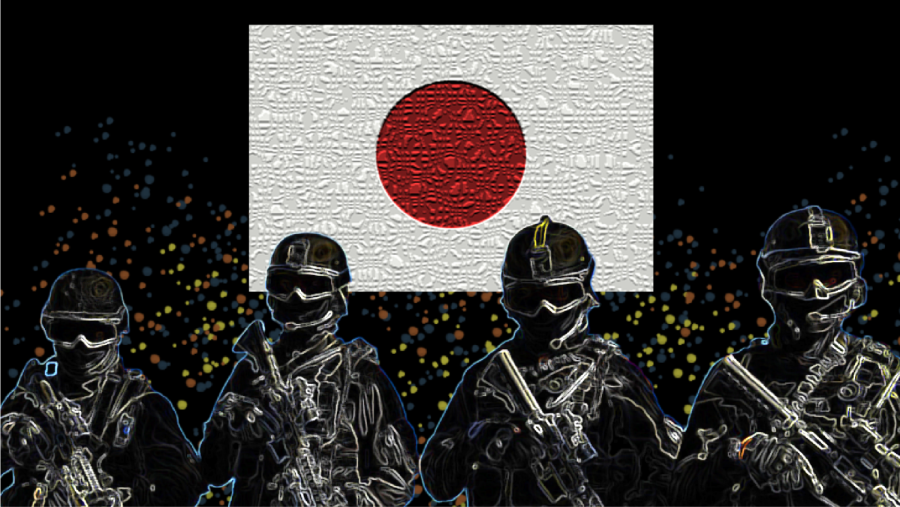Hibben: We Should Remember Japanese Americans’ Internment
(Graphic by Storey McDonald | The Daily Utah Chronicle)
March 5, 2022
On Feb. 17, a bill creating an annual day of observance for the internment of Japanese Americans during WWII was signed into law by Gov. Spencer Cox.
Sen. Jani Iwamoto and Rep. Karen Kwan sponsored the bill, designating Feb. 19 as this day of remembrance.
Japanese Americans’ internment was a shameful part of Utah and America’s racist history and should continue to be recognized and repaired. Memorializing our painful past is crucial to righting the wrongs of our country and learning what cannot be repeated.
History of Japanese Internment
The United States joined WWII after a Japanese attack on Pearl Harbor. Fearing Japanese Americans would conspire against the country, the U.S. government forcefully imprisoned these people. The majority of those interned were U.S. citizens but were deemed a threat because of racist stereotypes. It is worth noting that German and Italian Americans were not displaced, even though Italy and Germany were powerful enemies of the Allied powers.
Feb. 19 is the very same day that former President Franklin D. Roosevelt signed the executive order allowing for the internment of all threats to national security, 120,000 Japanese Americans. All Japanese Americans with at least 1/16th Japanese ancestry were forcibly removed from their homes and moved to detention facilities. Surrounded by barbed wire fences, interned families tried to make do while being watched by armed guards who were ordered to shoot anyone who tried to escape. Some lived in the camps for 3 years, unsure of their fate.
Topaz was a Japanese internment camp located in Utah. It was barren, had no running water and no protection from the unbearable sun. You can visit the camp today, along with the Topaz Museum which preserves the painful history of that area.
The Process of Reparations
The U.S. government has made reparations for these detention facilities, though some have criticized these efforts as too little, too late. In 1988, Ronald Reagan signed the Civil Liberties Act, which admitted the actions of the U.S. government were “racial prejudice, war hysteria and the failure of political leadership.” Survivors were given a formal apology and monetary compensation.
Sen. Iwamoto, whose grandfather was incarcerated for being one of the “dangerous enemy aliens,” created this bill to make sure our country’s actions are not forgotten. The bill designates Feb. 19 a day of “remembrance of the incarceration of Japanese Americans during World War II.”
My family immigrated here from Japan in search of new opportunities. With four daughters and one son, my grandparents worked hard to survive in a country that wasn’t supportive of immigrants. My grandmother studied to receive her citizenship, simultaneously renouncing her Japanese citizenship. I grew up in a home that was both American and Japanese, with chopsticks in the dishwasher and the occasional dress-up in my mother’s kimono. I could never imagine, however, having our loyalties to the U.S. questioned because of our race.
But, as I read textbooks in school and heard my classmates’ comments about the atomic bombing of Hiroshima and Nagasaki, I became very aware of the sentiment against part of me. My white-passing appearance allowed me to hear comments that accepted the horrors of WWII, like bombing civilians in Japan and imprisoning thousands of American civilians, as “part of war.” My textbooks told me it was impossible for WWII to end without ending innocent lives.
This day of remembrance legitimizes the experience of Japanese Americans and starts a conversation about anti-Asian hate in our country. Without memorializing the suffering of Americans, we cannot move on from these events. This helps us address stereotypes and turn a new tide in our history.
Remembering and Teaching History
A day of remembrance isn’t the only thing we can do. Racism against Asians continues today and has seen a violent rise during the pandemic. Public schools teach very little about Asian-American history, even though they contributed greatly to our present-day society. Our history isn’t just internment camps, it includes years of discrimination and important milestones. Teaching and celebrating Asian-American history is crucial to our country having a better understanding of the past, so we can treat each other better.
The U.S. prides itself on being a country that spreads and protects freedoms, and yet the imprisonment of Japanese Americans simply for their race stands in direct opposition to our values. This day of remembrance is a step to start a new discovery of Asian-American history. Much like critical race theory, we need to emphasize the human rights violations our country has committed against its own citizens. To make progress, we must constantly remember and closely inspect our dark history. Otherwise, we fail to improve upon our mistakes and are doomed to repeat them again.










Randy • Mar 6, 2022 at 6:39 am
Thank you for writing this article. My fathers family was incarcerated at Topaz. I visited the camp with him years ago and was very moved to see his name and his brother’s name listed on the Fillmore County Veteran’s memorial wall.